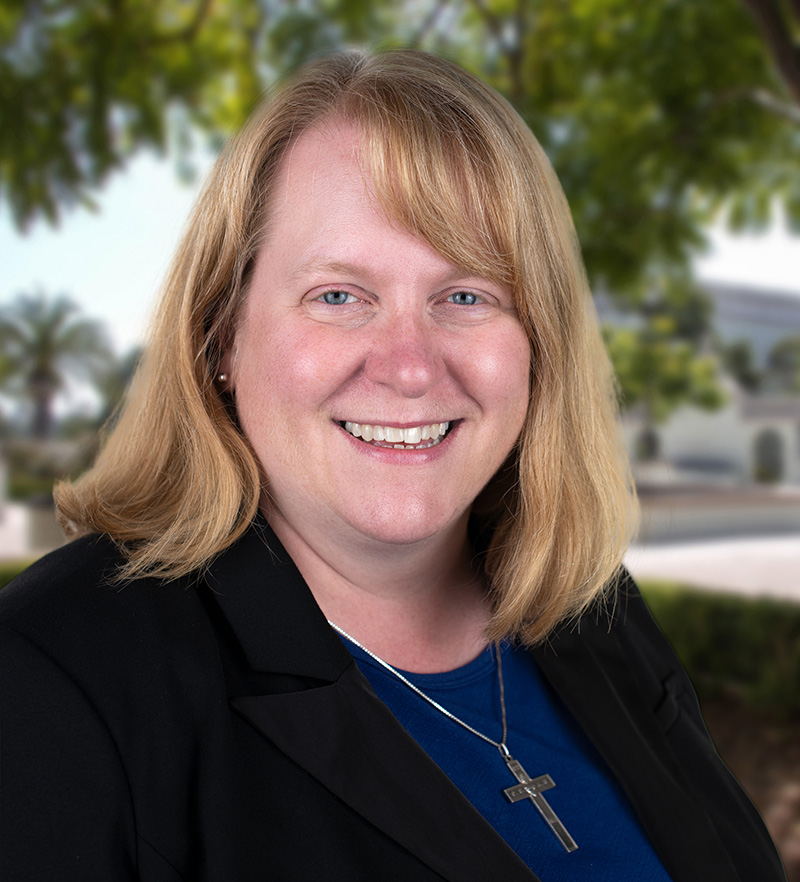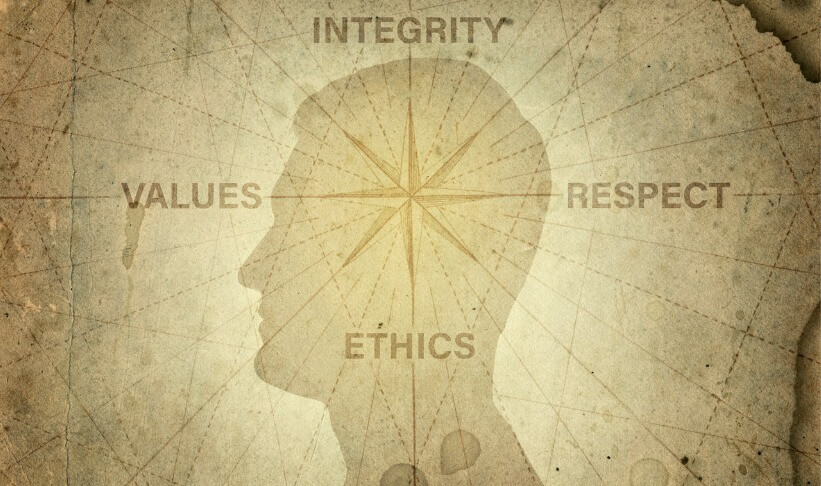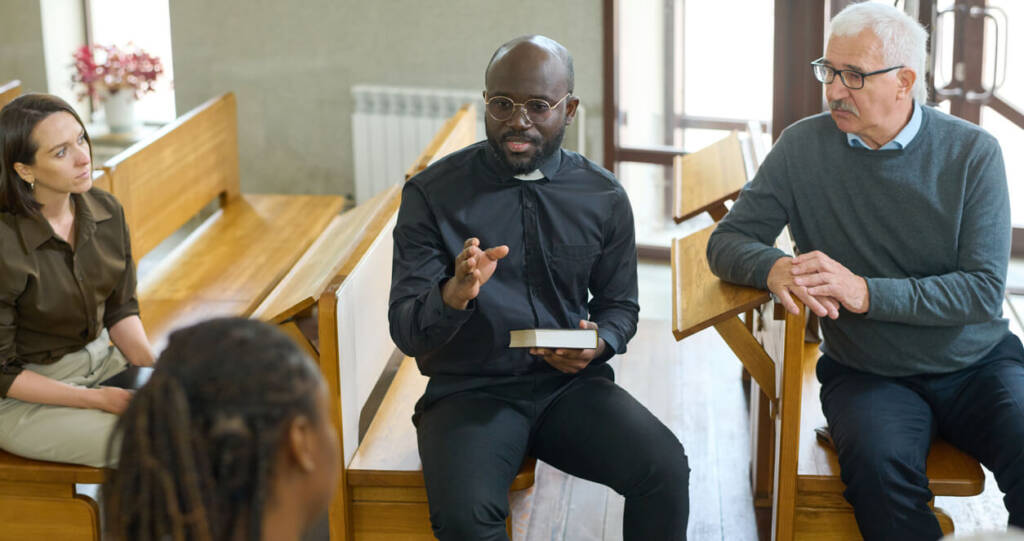Catholic moral theology establishes the behaviors and attitudes that allow us to live in union with Christ. These general life principles are meant to help followers make the right decisions according to their faith — but this is by no means an easy feat. Catholic morality addresses such complex and nuanced topics as marriage, sexuality, medicine, social justice, wealth, business, and more.
The study of moral theology gives us powerful tools with which to understand and share the Catholic tradition with others. Here, we explore the principles, teachings, and challenges that accompany Catholic moral theology, and provide a few helpful suggestions for living a moral life.
What Is Moral Theology?
Moral theology is a field of theological studies that applies central Christian beliefs to the problems of the world we live in. This approach to faith informs the day-to-day lives of the faithful, guiding their choices, decisions, actions, and reactions to events and challenges, from grand to minuscule. In short, moral theology provides principles for living in accordance with God’s word.
Our ability to study and adhere to moral teachings is, in itself, a gift from God. God bestowed upon us intelligence and reason to help us understand the world of creation, while also giving us free will to choose what we consider true and good. Each of us is made in God’s image and therefore we are good. At the same time, our free will allows us to choose to do things which are fundamentally not good. Moral theology gives us a standard by which to measure truth and goodness as God sees it.
Traditionally, this standard may have been used to answer the question, “What should I do or believe?” However, Catholic moral theology is grounded in virtue ethics, so the question becomes: “Who am I becoming as a result of this action or affection?” Since our faith journey is a wholly personal one, approaching daily decisions and choices with this question in mind helps us strengthen our relationship to our faith from within, rather than allow it to be shaped by external forces.
Teachings of Moral Theology
“Conscience is a judgment of reason by which the human person recognizes the moral quality of a concrete act.”
–Catechism of the Catholic Church, no. 1796
Whether in or outside of a religious context, all moral acts comprise three elements:
- What: The act itself (objective)
- Why: The intention of the act (subjective)
- Where, when, how, with/to whom, and the consequences: The context of the act
Catholic morality provides a framework for determining whether an act is right or wrong, good or bad, in or out of alignment with Christ’s teachings.
To be morally good, both our actions and our intentions need to align with the moral code. To that end, a morally bad intention leads to an inherently bad action, while a good intention cannot result in an objectively bad action. However, this does not give us carte blanche to act in any way we please as long as we “mean well” — there are acts that are fundamentally wrong, regardless of intention or circumstance. Examples include murder, adultery, deceit, or other destructive actions that compromise human health and well-being.
Catholic moral theology is grounded in the concepts of freedom, truth, natural law, human law, and human conscience (the general ability to know what is good and right, as it is willed by God). The moral framework built upon this foundation — the way in which we interact with or respond to these concepts — is shaped by principles from divine revelation, the interpretation of Scripture, and the tradition of the Church.
The principles of Catholic morality are not arbitrary; they are among God’s divine gifts to humankind, which include things like the Ten Commandments. The infamous tablets Moses carried down Mount Sinai established an ethical code for God’s followers and stated, in no uncertain terms, which behaviors would violate this code (Exodus 20:1–17). Though there were only ten principles written in stone, they implied that committing sins like envy, murder, lust, and idolatry would only engender more sin and a further fall from God’s grace.
Christian morality relies on the Old Testament beliefs but focuses more on what we should do rather than what is forbidden. Christ granted his disciples the authority to heal the sick, cast out demons, and proclaim God’s word — essentially, to keep his love alive (Matthew 10:1). Christ’s disciples have tried to live out his call to love ever since, leaning on both Scripture and tradition as the basis for additional moral guidance that addresses contemporary challenges.
SPOTLIGHT ON CURRICULUM
Moral Theology: Conscience and the Common Good
What does the moral life look like? How do we understand personal and social good in a pluralist society? How are our understandings of God, the human person, and the good connected? And what insights does Catholicism’s moral tradition — especially the Franciscan tradition — bring to this conversation? These are the sorts of questions that will animate this course as we examine imagination, holiness, sin, virtue, discernment, vocation, and other core concepts from Catholicism’s moral tradition.
Discover More Courses
Principles of Moral Theology
Of course, the world has changed significantly since the time of Jesus, and the moral questions Christians face need different answers. Catholic moral teaching has grown and developed as new issues have emerged over the millenia.
It’s important to remember, however, that an action is not inherently moral or immoral simply because a cardinal, bishop, pastor, or even the pope says it is. It is a Catholic’s duty to make their own moral judgments based on the following factors:
- Basic moral teachings of Christ: What do Christ and his disciples say that relates to the issue? Thinking critically, what did they mean?
- Related developments: Has the Church changed its guidance on this issue over the centuries?
- Human nature: How does this moral issue interact with the basic facts of our existence? Is our decision, action, behavior, or attitude in line with how God created us (in His image)?
- Human dignity: Does this issue — or our decision, action, behavior, or attitudetoward it — embody and engender respect for others made in the image of God?
- Common good: How does a particular decision, action, behavior, or attitude contribute to or detract from the good of humankind as a whole?
- Freedom: Does a particular action or behavior allow someone to live freely in accordance with their nature? Does the action or behavior impede their growth as a human being? Are they essentially living in harmony with God’s plan while exercising their free will?
As Catholics living in the 21st century, we should remain open to the fact that the Church will declare new moral teachings in our lifetime, while always adhering to the received tradition.
Everyone, religious or not, makes decisions according to their own moral code every day. To exercise your moral muscles and practice thinking critically about your own words and actions, seek out books, podcasts, videos, and other media that discuss morality and ethics in today’s world.
Challenges to Moral Theology
Naturally, Catholic moral theology must contend with a persistent conundrum: taking a position on issues that are not addressed in scripture. For example, there is nothing in the Bible that provides a right or wrong way to respond to concepts like racism, contraception, or gender identity. Though the Church may establish new guidance around developing issues, it is not always easy for followers to change their lifelong perceptions or personal code of ethics.
Catholics who feel challenged by new papal statements or reforms (such as Vatican II) might presume the Church is “caving” to societal pressures or changing in an attempt to attract new followers. However, this presumes that the Church is making decisions that are not founded in reason, revelation, and careful study of the scripture — the very blueprint for moral theology.
See overview: University of San Diego – Master of Theological Studies
Others may find it difficult to accept Church guidance that asks them to confront their own long-held beliefs or way of life, such as teachings or statements on sexuality, abortion, gender, and medical research. Much of this internal moral struggle likely comes from a Western inclination to favor personal autonomy over tradition, or a prioritization of human law over spiritual guidance. It’s important to make the distinction between the laws created to govern our society and the moral code by which we live our personal lives — the two may not always align. Therein lies one of the greatest challenges inherent in Catholic moral theology today, and the source of much political and social turmoil.
It is the Church’s responsibility — and, by extension, each disciple’s duty — to express and convey Catholic moral teachings in a way that does not oppress others but, rather, educates and empowers them to practice ethical free will.
How to Live a Moral Life
While the scripture provides moral lampposts to light our way through life, we are often called upon to navigate the shadows in between using our own discretion. Every person’s journey will look different, but by following some basic guidelines, we can ensure we are living a moral life in God’s light, whether at work, at home, in church, or in our community.
Love above all else: The source of all Catholic morality is love — God’s love for us, ours for Him, love for our neighbor, love of all creation. When we allow ourselves to be led by love, we cannot live an immoral life.
Exercise mercy and patience: You will not agree with everyone you meet in your lifetime. If someone follows a different moral code, it is not your job to change them — rather, be a positive representative of your faith by showing them kindness and compassion. If you meet someone attempting to make a moral change, express solidarity with their journey.
Don’t use morality as a weapon: Moral teachings should never be used to oppress others. Use them to educate, enlighten, empower, invite, and understand.
Embody virtue: Virtues such as generosity, charity, fortitude, purity, compassion, honesty, self-discipline, and others guide our behavior and help us to avoid sin and immoral acts. These virtues are gifts from God that help us live out our faith and be of service to others. When we practice virtuous acts and recognize the virtues in those around us, we become the moral beacons God intends us to be.
If you feel called to explore Catholic moral theology in a contemporary context, consider the online Master of Theological Studies – Franciscan Theology program from the Francsican School of Theology at the University of San Diego. This unique degree program approaches Catholicism through the lens of the welcoming, joy-filled Franciscan charism, which respects and values people from all walks of life.
Discover all that the MTS-FT program offers to those seeking greater meaning in life and vocation. Connect with an enrollment advisor for more information.





